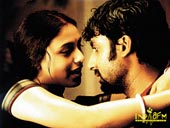 |
 |
 |
| (From top) Abhishek and Rani in Yuva; a scene from the Broadway version of Bombay Dreams; Shah Rukh Khan in Swades |
In Mumbai for the music release of his latest Bollywood venture Swades, A.R. RAHMAN talks to Pratim D. Gupta about his Bengali inspirations, Calcutta connections and some little-known elements of his music.
With Swades, you are back with Ashutosh Gowariker and Javed Akhtar. Do we expect another masterpiece like Lagaan?
I know there are big expectations from all of us. Swades, however, is a lot quieter than Lagaan. We have gone against what is happening around us in the world of music. There are two kinds of music. One that sizzles at first and then fades away and the other that keeps growing with the film. The music of Swades has got a really good platform to grow.
How would you define the sound of Swades?
I am not really very good at explaining my music (laughs). You have to hear it and find out. All I can say is that Swades takes you back to melody. It is not electronica at all? It is, perhaps, opposite to Yuva.
But Yuva was hailed as one of your best scores?
Yuva was never meant to have music in the first place. I was just supposed to write the background score for the film. After he shot the film, Mani Sir decided to have songs. He asked me to give a dance track (Fanaa) and a Bengali track (Kabhi neem neem)? So the Yuva music was the result of a process of evolution, which had to match his film-making.
Do you reserve your best music for Mani Ratnam?
That?s for others to decide. Where Mani Sir is different from other directors is that he doesn?t give me any borders. He gives me a lot of free hand and allows me to explore the whole art of music. So I am most happy when I work with him.
When asked to compose a Bengali song, what were your inspirations?
I had listened to some baul stuff. But Kabhi neem neem was created on the spot. I was playing the piano and I came up with the tune. It helped that the song was sung by a Bengali (Madhusree).
There is this big mystery about your working style where you get your singers to sing without any music and add the instruments later?
Music should be spontaneous. The general pattern is that you start off with a tune and then go to the orchestra, the rhythm and finally the singer. But I do not want my singers to be confined within these mechanical barriers. The voice should be able to go a bit farther. So what I do is create a rough template for the singer. Then I let him or her really explore the song. Once that is done, we decide later what to add to the song to make it sound better.
You recently scored a track for Vanessa Mae?s new album. How was the experience?
Vanessa is a monster on stage (laughs). I had a lot of fun doing the number. I have given something Indian for the track, as was expected.
Has this Indianness made you a legend of sorts in the West?
There are loads of people in the West to score Western stuff. And they can do it better than me. Bombay Dreams has shown that the world is ready to accept Indian music and I feel good producing that. I would never do any track that they can do.
 |
| A.R. Rahman hitting the keys |
After the kind of accolades you have received abroad, do you still feel motivated enough to score music for Indian films?
Yes. That is what got me there. The experiences in the West help me create something more challenging here.
What projects do you have in hand, both here and abroad?
There?s Ketan Mehta?s Rising, a Raj Kumar Santoshi film and Shyam Benegal?s Netaji. Deepa Mehta?s Water, which I did four years ago, will come out as Water Moon. There are a couple of stage musicals in the West. I also finished writing the music for the stage version of The Lord of the Rings. And my Chinese film Warriors of the Heaven and Earth will release in the US shortly.
How do you explain this strange phenomenon of your music growing on the listener?
Everybody says that. I feel, music is made that way. There are lots of layers in every song, which I keep adding. When people listen to it repeatedly, they unravel one layer after the other.
Your Calcutta concert was a huge hit. Would you like to come back to perform here?
It was one of the best shows I have done in my eight years of doing concerts. Calcutta is still very close to me, my father having worked with Salil Chowdhury for Chemeen. I still have a picture of them together in Calcutta. I would love to come back to the city, may be for the music release of Netaji.
Back to Swades.Will this see A.R. Rahman going back to his Roja days of good ol? melody?
There is a certain kind of music in my blood. Ragas like yaman, darbari, kalawati are rooted in my mind. What I try to do is create an appealing song with a classical raga. The Tara song in Swades is nothing but a faster form of raga kalawati. But you can only try these things with a known team like that of Ashutosh?s. It?s no use doing a fantastic track if it?s not heard.










